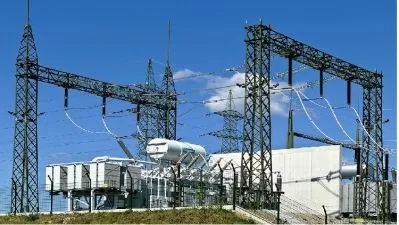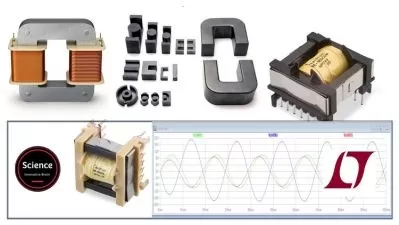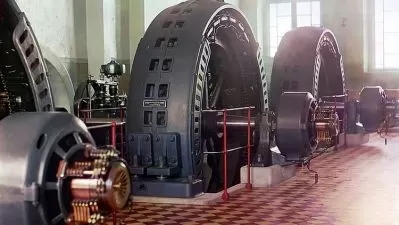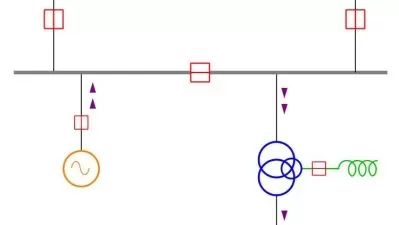Power Engineering I : Intro to Power Analysis in AC Systems
Afterclap Academy
4:55:28
Description
Power Engineering Introduction: Mastering AC Circuits for Electrical Success
What You'll Learn?
- Understand the fundamental principles of power generation, transmission, and distribution.
- Analyze power system parameters and perform simple calculations for power flow and losses.
- Recognize the significance of power quality and methods to improve it in electrical networks.
- Understand the principles of AC circuits, including voltage, current, impedance, and phase relationships.
- Calculate power and power factor in AC circuits, and explore methods to improve power factor.
Who is this for?
What You Need to Know?
More details
DescriptionWelcome to the comprehensive world of Power Engineering Introduction, where you will embark on an enlightening journey into the fascinating realm of AC Circuits. In this course, you will gain the essential background and knowledge required to understand the fundamental principles that govern power in AC Circuits, a cornerstone of electrical engineering.
Through engaging lectures, interactive exercises, and real-world examples, you will delve deep into the intricacies of AC circuits, exploring voltage, current, impedance, phase relationships, and more. You will learn how to apply Ohm's law and Kirchhoff's laws to analyze and solve complex AC circuit problems confidently.
The course will equip you with practical skills to calculate power and power factor in AC circuits, and explore methods to enhance power factor, optimizing energy efficiency in electrical systems. Additionally, you will differentiate between series and parallel AC circuits, mastering techniques to determine equivalent impedance and comprehend their diverse applications in real-world scenarios.
As you progress, you will uncover the intriguing concept of resonance in AC circuits, understanding its profound implications on circuit behavior. Moreover, you will gain insight into three-phase AC systems and their advantages in power transmission, a vital aspect of modern power engineering.
This course is designed for a diverse audience, including electrical engineering students, recent graduates, entry-level engineers, electricians, technicians, renewable energy enthusiasts, and non-technical professionals in the energy sector. Whether you are new to the field or seeking to expand your expertise, this course will empower you with the knowledge and confidence to tackle the challenges of power engineering in AC circuits.
Get ready to amplify your understanding of AC circuits and open the doors to exciting opportunities in the dynamic world of power engineering. Enroll now and embark on a journey that will illuminate your path to electrical success!
You contact me whenever you like.
For this you may find the contact information on instructor profile.
Sincerely,
kavcar
Who this course is for:
- Electrical Engineering Students: This course is designed for undergraduate students pursuing degrees in electrical engineering or related fields. It provides a solid foundation in power engineering principles and AC circuits, essential for their academic and future professional success.
- Recent Graduates and Entry-Level Engineers: Graduates and early-career engineers seeking to enter the power industry will benefit from this course. It equips them with practical knowledge and skills in AC circuits, preparing them for engineering roles in power generation, transmission, and distribution.
- Professionals Transitioning to Power Engineering: Professionals from other engineering disciplines or technical backgrounds who want to shift their careers towards power engineering will find this course valuable. It offers them a comprehensive introduction to the core concepts of AC circuits and their applications in power systems.
- Electricians and Technicians: Electricians and technicians working in the electrical industry can enhance their expertise by enrolling in this course. It covers the theoretical aspects of AC circuits, enabling them to better understand electrical systems and troubleshoot complex issues.
Welcome to the comprehensive world of Power Engineering Introduction, where you will embark on an enlightening journey into the fascinating realm of AC Circuits. In this course, you will gain the essential background and knowledge required to understand the fundamental principles that govern power in AC Circuits, a cornerstone of electrical engineering.
Through engaging lectures, interactive exercises, and real-world examples, you will delve deep into the intricacies of AC circuits, exploring voltage, current, impedance, phase relationships, and more. You will learn how to apply Ohm's law and Kirchhoff's laws to analyze and solve complex AC circuit problems confidently.
The course will equip you with practical skills to calculate power and power factor in AC circuits, and explore methods to enhance power factor, optimizing energy efficiency in electrical systems. Additionally, you will differentiate between series and parallel AC circuits, mastering techniques to determine equivalent impedance and comprehend their diverse applications in real-world scenarios.
As you progress, you will uncover the intriguing concept of resonance in AC circuits, understanding its profound implications on circuit behavior. Moreover, you will gain insight into three-phase AC systems and their advantages in power transmission, a vital aspect of modern power engineering.
This course is designed for a diverse audience, including electrical engineering students, recent graduates, entry-level engineers, electricians, technicians, renewable energy enthusiasts, and non-technical professionals in the energy sector. Whether you are new to the field or seeking to expand your expertise, this course will empower you with the knowledge and confidence to tackle the challenges of power engineering in AC circuits.
Get ready to amplify your understanding of AC circuits and open the doors to exciting opportunities in the dynamic world of power engineering. Enroll now and embark on a journey that will illuminate your path to electrical success!
You contact me whenever you like.
For this you may find the contact information on instructor profile.
Sincerely,
kavcar
Who this course is for:
- Electrical Engineering Students: This course is designed for undergraduate students pursuing degrees in electrical engineering or related fields. It provides a solid foundation in power engineering principles and AC circuits, essential for their academic and future professional success.
- Recent Graduates and Entry-Level Engineers: Graduates and early-career engineers seeking to enter the power industry will benefit from this course. It equips them with practical knowledge and skills in AC circuits, preparing them for engineering roles in power generation, transmission, and distribution.
- Professionals Transitioning to Power Engineering: Professionals from other engineering disciplines or technical backgrounds who want to shift their careers towards power engineering will find this course valuable. It offers them a comprehensive introduction to the core concepts of AC circuits and their applications in power systems.
- Electricians and Technicians: Electricians and technicians working in the electrical industry can enhance their expertise by enrolling in this course. It covers the theoretical aspects of AC circuits, enabling them to better understand electrical systems and troubleshoot complex issues.
User Reviews
Rating
Afterclap Academy
Instructor's Courses
Udemy
View courses Udemy- language english
- Training sessions 40
- duration 4:55:28
- Release Date 2023/09/10
















